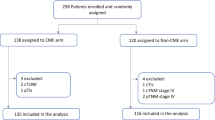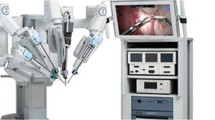Abstract
Introduction
Robotic surgery provides an alternative option for a minimal access approach. It provides a stable platform with high definition three-dimensional views and improved access, which enhances the capabilities for precise dissection in a narrow surgical field. These distinctive features have made it an attractive option for colorectal surgeons.
Aim
The aim of this study was to present a standardised technique for single-docking robotic rectal resection and to analyse clinical outcomes of the first 100 robotic rectal procedures performed in a single centre between May 2013 and April 2015.
Method
Prospectively collected data related to 100 consecutive patients who underwent single-docking robotic rectal surgery was analysed for surgical and oncological outcomes.
Results
Sixty-six patients were male, the median age was 67 years (range-24–92). Eighteen patients had neo-adjuvant chemoradiotherapy whilst 23 patients had BMI >30. Procedures performed included anterior resection (n = 74), abdominoperineal resection (n = 10), completion proctectomy (n = 9), restorative proctectomy with ileal pouch–anal anastomosis (IPAA) (n = 5) and Hartmann’s procedure (n = 2). The median operating time was 240 min (range-135–456), and median blood loss was 10 ml (range 0–200). There was no conversion or intra-operative complication. Median length of stay was 7 days (range, 3–48) and readmission rate was 12 %. Thirty-day mortality was zero. Postoperatively, two patients had an anastomotic leak whilst two had small bowel obstruction. The median lymph node harvest was 18 (range, 6–43).
Conclusion
The single-docking robotic technique should be considered as an alternative option for rectal surgery. This approach is safe and feasible and in our study it has demonstrated favourable clinical outcomes.




Similar content being viewed by others
References
Ohtani H, Tamamori Y, Arimotoa T et al (2012) A meta-analysis of the short- and long term results of randomized controlled trials that compared laparoscopy assisted and open colectomy for colon cancer. J Cancer 3:49–57
Tjandra JJ, Chan MK (2006) Systematic review on the short-term outcome of laparoscopic resection for colon and recto-sigmoid cancer. Color Dis 8:375–388
Maggiori L, Panis Y (2013) Is it time for a paradigm shift: “laparoscopy is now the best approach for rectal cancer”? Transl G 2224–4778
Nelson H, Sargent DJ, Wieand HS et al (2004) A comparison of laparoscopically assisted and open colectomy for colon cancer. N Engl J Med 350:2050–2059
Abraham NS, Young JM, Solomon MJ (2004) Meta-analysis of short-term outcomes after laparoscopic resection for colorectal cancer. Br J Surg 91:1111–1124
Aly EH (2009) Laparoscopic colorectal surgery: summary of the current evidence. Ann R Coll Surg Engl 91:541–544
Lee SW (2009) Laparoscopic procedures for colon and rectal cancer surgery. Clin Colon Rectal Surg 22:218–224
Delaney CP, Lynch AC, Senagore AJ, Fazio VW (2003) Comparison of robotically performed and traditional laparoscopic colorectal surgery. Dis Colon Rectum 46:1633–1639
Cecil TD, Taffinder N, Gudgeon AM (2006) A personal view on laparoscopic rectal cancer surgery. Color Dis 8:30–32
Shearer R, Gale M, Aly OE, Aly EH (2013) Have early post- operative complications from laparoscopic rectal cancer surgery improved over the past 20 years? Color Dis 15:1211–1226
Ballantyne GH, Moll F (2003) The da Vinci telerobotic surgical system: the virtual operative field and telepresence surgery. Surg Clin N Am 83:1293–1304
Baik SH (2008) Robotic colorectal surgery. Yonsei Med J 49:891–896
Stylopoulos N, Rattner D (2003) Robotics and ergonomics. Surg Clin N Am 83:1321–1337
Kim N-K, Kang J (2010) Optimal total mesorectal excision for rectal cancer: the role of robotic surgery from an expert’s view. J Korean Soc Coloproctol 26:377–387
Weber PA, Merola S, Wasielewski A et al (2002) Telerobotic-assisted laparoscopic right and sigmoid colectomies for benign disease. Dis Colon Rectum 45:1689–1694, discussion 1695–1686
Zimmern A, Prasad L, Desouza A et al (2010) Robotic colon and rectal surgery: a series of 131 cases. World J Surg 34:1954–1958
Rawlings AL, Woodland JH, Crawford DL (2006) Telerobotic surgery for right and sigmoid colectomies: 30 consecutive cases. Surg Endosc 20:1713–1718
Deutsch GB, Sathyanarayana SA, Gunabushanam V, Mishra N et al (2012) Robotic vs. laparoscopic colorectal surgery: an institutional experience. Surg Endosc 26:956–963
Sawada H, Egi H, Hattori M et al (2015) Initial experiences of robotic versus conventional laparoscopic surgery for colorectal cancer, focusing on short-term outcomes: a matched case–control study. World J Surg Oncol 13:103
Shiomi A, Kinugasa Y, Yamaguchi T et al (2014) Robot-assisted rectal cancer surgery: short-term outcomes for 113 consecutive patients. Int J Color Dis 29:1105–1111
AlAsari S, Min BS (2012) Robotic Colorectal Surgery: A Systematic Review. ISRN Surgery 2012:293894. doi:10.5402/2012/293894
Miskovic D, Foster J, Agha A et al (2015) Standardization of laparoscopic total mesorectal excision for rectal cancer: a structured international expert consensus. Ann Surg 261:716–722
D’Annibale A, Pernazza G, Morpurgo E et al (2010) Robotic right colon resection: evaluation of first 50 consecutive cases for malignant disease. Ann Surg Oncol 17:2856–2862
Hellan M, Anderson C, Ellenhorn JDI et al (2007) Short-term outcomes after robotic-assisted total mesorectal excision for rectal cancer. Ann Surg Oncol 14:3168–3173
Baik SH, Kwon HY, Kim JS et al (2009) Robotic versus laparoscopic low anterior resection of rectal cancer: short-term outcome of a prospective comparative study. Ann Surg Oncol 16:1480–1487
Hemandas A, Flashman KG, Farrow J et al (2011) Modular training in laparoscopic colorectal surgery maximizes training opportunities without clinical compromise. World J Surg 35:409–414
Aly EH (2014) Robotic colorectal surgery: summary of the current evidence. Int J Color Dis 29:1–8
Kuhry E, Schwenk W, Gaupset R et al (2008) Long-term outcome of laparoscopic surgery for colorectal cancer: a Cochrane systematic review of randomised controlled trials. Cancer Treat Rev 34:498–504
Kariv Y, Delaney CP (2005) Robotics in colorectal surgery. Minerva Chir 60:401–416
Giulianotti PC, Coratti A, Angelini M et al (2003) Robotics in general surgery: personal experience in a large community hospital. Arch Surg 138:777–784
Obias V, Sanches C, Nam A et al (2011) Totally robotic single-position ‘flip’ arm technique for splenic flexure mobilizations and low anterior resections. Int J Med Robot 7:123–126
Hellan M, Stein H, Pigazzi A (2009) Totally robotic low anterior resection with total mesorectal excision and splenic flexure mobilization. Surg Endosc 23:447–451
Mackenzie H, Miskovic D, Ni M et al (2013) Clinical and educational proficiency gain of supervised laparoscopic colorectal surgical trainees. Surg Endosc 27:2704–2711
Jiménez-Rodríguez RM, Díaz-Pavón JM, de la Portilla de Juan F et al (2013) Learning curve for robotic-assisted laparoscopic rectal cancer surgery. Int J Color Dis 28:815–821
Kim HJ, Choi GS, Park JS, Park SY (2014) Multidimensional analysis of the learning curve for robotic total mesorectal excision for rectal cancer: lessons from a single surgeon’s experience. Dis Colon Rectum 57:1066–1074
Yang Y, Wang F, Zhang P et al (2012) Robot assisted versus conventional laparoscopic surgery for colorectal disease, focusing on rectal cancer: a meta-analysis. Ann Surg Oncol 19:3727–3736
Scarpinata R, Aly EH (2013) Does robotic rectal cancer surgery offer improved early postoperative outcomes? Dis Colon Rectum 56:253–262
van der Pas MH, Haglind E, Cuesta MA et al (2013) Laparoscopic versus open surgery for rectal cancer (COLOR II): short-term outcomes of a randomised, phase 3 trial. Lancet Oncol 14:210–218
Baek SJ, Kim SK, Cho JS et al (2012) Robotic versus conventional laparoscopic surgery for rectal cancer: a cost analysis from a single institute in Korea. World J Surg 36:2722–2729
Tou S, Bergamaschi R, Heald RJ, Parvaiz A (2015) Structured training in robotic colorectal surgery. Color Dis 17:185
Broholm M, Pommergaard HC, Gogenur I (2015) Possible benefits of robot-assisted rectal cancer surgery regarding urological and sexual dysfunction: a systematic review and meta-analysis. Color Dis 17:375–381
Author information
Authors and Affiliations
Corresponding author
Additional information
What does this paper add to the literature?
There is limited data about the single-docking robotic rectal resection. This series shows that the single-docking approach is a feasible and has been applied successfully in 100 consecutive cases.
This article adds to the evidence to support the potential of robotic rectal surgery as important alternative option for patients with colorectal cancer.
Rights and permissions
About this article
Cite this article
Ahmed, J., Nasir, M., Flashman, K. et al. Totally robotic rectal resection: an experience of the first 100 consecutive cases. Int J Colorectal Dis 31, 869–876 (2016). https://doi.org/10.1007/s00384-016-2503-z
Accepted:
Published:
Issue Date:
DOI: https://doi.org/10.1007/s00384-016-2503-z




